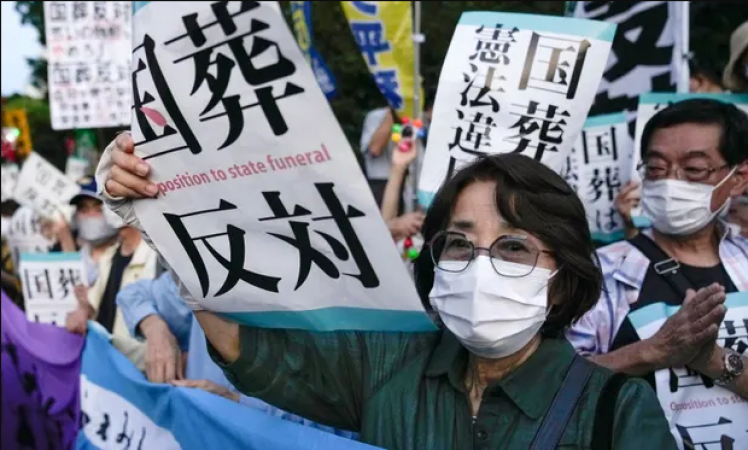
Japan: Japan will spend around 1.65 billion yen (£10.1 million) on the funeral of the late former prime minister Shinzo Abe, who was shot dead during a campaign speech in July, despite growing public opposition to the plan.
Due to information about taxpayer spending and the relationship between ruling party politicians and the Unification Church, the majority of voters oppose the ceremony according to the polls. This has put pressure on the government to cancel the ceremony.
The government initially estimated that the funeral, which is scheduled for 27 September, would cost less than 250 million yen, but later acknowledged that this figure did not include expenses for security and hosting foreign dignitaries. Is.
According to the chief cabinet secretary, Hirokazu Matsuno, the cost of policing the event is expected to be 800 million yen, and accommodating foreign delegations will add another 600 million yen to the tab.
Matsuno answered a question that estimated the total cost to be around 1.7 billion yen: "If we give a simple estimate, I think the total will be closer to what you said."
More than 6,000 people, including Barack Obama, Kamala Harris and Emmanuel Macron, will attend the ceremony at Tokyo's Nippon Budokan Hall, according to the Kyodo news agency.
According to Matsuno, about 50 of the 190 foreign delegations will have "heads of state" VIPs.
The revised amount was criticized by Jun Azumi, a member of parliament of the opposition Constitutional Democratic Party, who said the cost was six times higher than the government's initial estimate.
Public opposition to the plans has increased in recent weeks, following revelations of links between the ruling Liberal Democratic Party and members of the Unification Church, whose followers are known as Moonies.
The shooting suspect, Tetsuya Yamagami, told police that he chose Abe as his target because of the latter's support for the church, which he claimed was responsible for his family's financial ruin.
In a congratulatory video message that he sent to the church-affiliated group last year, Abe praised his dedication to traditional family values. His grandfather, Nobusuke Kishi, a former prime minister, was instrumental in elevating the church in Japan as a post-World War II defense against communism.
The ceremony will be the first of its kind since 1967, when post-war Prime Minister Shigeru Yoshida was given a state funeral. According to opinion polls, the prime minister, Fumio Kishida, has failed to garner public support for the event.
Last week, Kishida announced that he understood how the Unification Church scandal had damaged public confidence in politics and would demand that party MPs break their ties with the group.
He announced that the general public would not be forced to mourn the divisive conservative Abe, who resigned in 2020 after serving as Japan's longest-serving prime minister.
In a poll this month by the Yomiuri Shimbun newspaper, 56% of respondents said they were against state funerals, while 38% said they were in favor.
A petition with 400,000 signatures was recently submitted by civic groups opposing the ceremony, and last week, an estimated 4,000 people protested outside parliament.
In response to China's initiatives Japan resumes its courtship of Africa